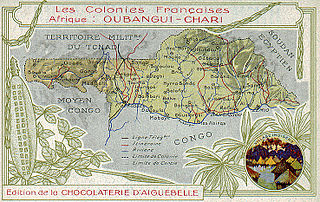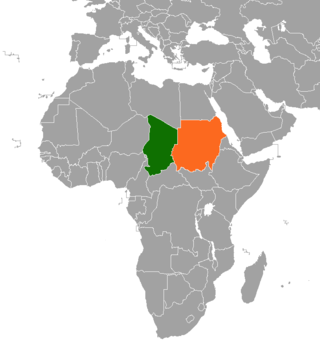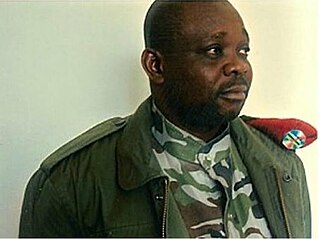Central African Republic | Chad |
|---|---|
Both countries established diplomatic relations on 29 February 1964 when the first accredited Permanent Representative (Ambassador) of Chad to Central African Republic Mr. Thomas Keiro was appointed. [1]
Central African Republic | Chad |
|---|---|
Both countries established diplomatic relations on 29 February 1964 when the first accredited Permanent Representative (Ambassador) of Chad to Central African Republic Mr. Thomas Keiro was appointed. [1]
Chad was one of President François Bozizé's closest allies. Before seizing power in 2003, Bozizé's rebel group was equipped and trained in Chad. The group that finally overthrew President Ange-Félix Patassé consisted of–in addition to Bozizé's own rebels–100 soldiers from the Chad National Army. In addition to the 121 Chadian soldiers in the Multinational Force in the Central African Republic (FOMUC), there are still 150 soldiers from Chad in the CAR. The majority is found within the president's lifeguard, while others patrol Bangui and the north-west parts of the country. [2]
Chad's president Idriss Déby has an interest in tranquility in north-western CAR, due to the proximity to the location of the Chad-Cameroon Petroleum Development and Pipeline Project. In April 2006, the Chadian rebel group United Front for Democratic Change, which is based in Darfur used C.A.R. as a transit route to Chad, when attacking N'Djamena. Bozizé, who has received much support from President Déby, immediately decided to close the CAR-Sudan border (a decision which he has no capacity at all to enforce). [2]
The border was officially closed between April and December. Already a couple of weeks later, an Antonov cargo plane crossed the border from Sudan and landed at Tiringoulou airport in C.A.R., where it unloaded weapons and about 50 armed men who spread out in the area. In the end of June, Central African military and FOMUC peacekeepers clashed with these men near Gordil, resulting in at least 30 casualties. [2]
Chad had also maintained good relations with the previous president, Patassé. They were one of the countries that sent troops to defend Patassé during the mutinies in 1996-1997 and assisted in negotiating the subsequent Bangui Agreements. Following the increase of violence in north-western C.A.R. in late 2005, there were at the end of 2006 about 50,000 refugees from C.A.R. in Chad. [3]
Chad maintains an embassy in Bangui. [4]
The Central African Republic maintains an embassy in N'Djamena.
Chad, officially the Republic of Chad, is a landlocked country in Central Africa. It borders Libya to the north, Sudan to the east, the Central African Republic to the south, Cameroon and Nigeria to the southwest, and Niger to the west. Due to its distance from the sea and its largely desert climate, the country is sometimes referred to as the "Dead Heart of Africa".
The Chad National Army consists of the five Defence and Security Forces listed in Article 185 of the Chadian Constitution that came into effect on 4 May 2018. These are the National Army, the National Police, the National and Nomadic Guard (GNNT) and the Judicial Police. Article 188 of the Constitution specifies that National Defence is the responsibility of the Army, Gendarmerie and GNNT, whilst the maintenance of public order and security is the responsibility of the Police, Gendarmerie and GNNT.

The history of the Central African Republic is roughly composed of four distinct periods. The earliest period of settlement began around 10,000 years ago when nomadic people first began to settle, farm and fish in the region. The next period began around 10,000 years prior.
The Central African Armed Forces are the armed forces of the Central African Republic and have been barely functional since the outbreak of the civil war in 2012. Today they are among the world's weakest armed forces, dependent on international support to provide security in the country. In recent years the government has struggled to form a unified national army. It consists of the Ground Force, the gendarmerie, and the National Police.

President François Bozizé has said that one of his priorities is to get the support of the international community. This has indeed been visible in his relations to donor countries and international organisations. At the same time it is difficult to have an open policy towards neighbouring countries when they are used as safe haven by rebels regularly attacking Central African Republic (C.A.R.), or when one allied country is in war with another.

Bangui is the capital and largest city of the Central African Republic. It was established as a French outpost in 1889 and named after its location on the northern bank of the Ubangi River ; the Ubangi itself was named from the Bobangi word for the "rapids" located beside the settlement, which marked the end of navigable water north from Brazzaville. The majority of the population of the Central African Republic lives in the western parts of the country, in Bangui and the surrounding area.

François Bozizé Yangouvonda is a Central African politician who was President of the Central African Republic from 2003 to 2013. He was also the only Central African president born in modern day Gabon.

Ange-Félix Patassé was a Central African politician who was president of the Central African Republic from 1993 until 2003, when he was deposed by the rebel leader François Bozizé in the 2003 coup d'état. Patassé was the first president in the CAR's history to be chosen in what was generally regarded as a fairly democratic election (1993) in that it was brought about by donor pressure on President André Kolingba and assisted by the United Nations Electoral Assistance Unit.

The Chadian Civil War of 2005–2010 began on December 18, 2005. Since its independence from France in 1960, Chad has been swamped by civil wars between the Arab-Muslims of the north and the Sub-Saharan-Christians of the south. As a result, leadership and presidency in Chad drifted back and forth between the Christian southerners and Muslim northerners. When one side was in power, the other side usually started a revolutionary war to counter it.
The Battle of N'Djamena was a battle between the forces of the revolutionary United Front for Democratic Change (UFCD) and the military of Chad that occurred on 13 April 2006 when rebel forces launched an assault on the capital of Chad in the pre-dawn hours, attempting to overthrow the government of President Idriss Déby Itno from their bases an estimated thousand miles east.
Events from the year 2007 in Chad.

The populations of eastern Chad and western Sudan established social and religious ties long before either nation's independence, and these remained strong despite disputes between governments. In recent times, relations have been strained due to the conflict in Darfur and a civil war in Chad, which both governments accuse the other of supporting.

The People's Army for the Restoration of DemocracyAPRD was a rebel group operating in the northwest of the Central African Republic (CAR). The APRD was formed in 2006 following the 2003 coup which overthrew President Ange-Félix Patassé. It is one of several groups which fought in the 2004-2007 Central African Republic Bush War. Initially claiming it wished to overthrow current CAR President François Bozizé, the APRD was the last of the three rebel coalitions to engage in the 2007 peace process. The group participated in the 2008 Inclusive Peace Dialog, and in early 2009 entered a coalition government with Bozizé and other civil and military oppositions groups.

Abakar Sabone was the leader of the Movement of Central African Liberators for Justice rebel group during the Central African Republic Bush War.

The Central African Republic Civil War is an ongoing civil war in the Central African Republic (CAR) involving the government, rebels from the Séléka coalition, and Anti-balaka militias.

An internal conflict in the Central African Republic (CAR) started essentially on 13 April 2013, when the government of President Michel Djotodia officially took over. The fighting was between the government of the Central African Republic's former Séléka coalition of rebel groups, who are mainly from the Muslim minority, and the mainly Christian anti-balaka coalition. The conflict was part of the ongoing Central African Republic Civil War (2012–present). International organisations, such as the United Nations, had warned of a possible genocide. UNSC resolution 2122 authorised the African-led International Support Mission to the Central African Republic (MISCA) to be deployed to the country, and France to lead operations with additional troops sent to bolster its force in the country. Following a summit of Economic Community of Central African States (CEEAC), including the attendance of all the country's MPs, Djotodia resigned from the presidency on 10 January 2014. The National Transitional Council chose Bangui mayor Catherine Samba-Panza as interim president on 20 January 2014. A period of lawlessness prevailed during the early days of her presidency with people moving into religiously cleansed neighbourhoods as the UN warned of a genocide. Anti-Balaka attacks continued against Muslim civilians.
A coup d'état occurred in March 2003 in the Central African Republic when the forces of General François Bozizé marched on Bangui, the country's capital, while President Ange-Félix Patassé was attending a regional Community of Sahel–Saharan States leaders' summit in Niger.

Central African Republic–France relations are foreign relations between the Central African Republic (CAR) and France. Both nations are members of the Francophonie and the United Nations.
This article is a list of events in the year 2006 in Chad.

Abdoulaye Miskine is a Chadian-Central African warlord and a former Central African Armed Forces officer who served under Patasse Government. He was the leader of Democratic Front of the Central African People.